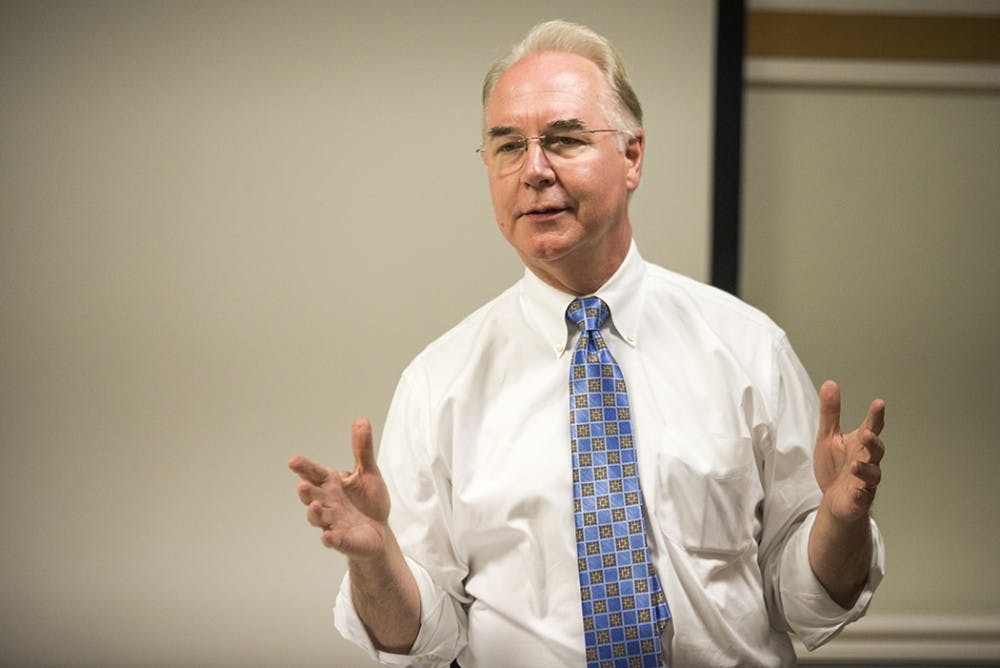Representative Tom Price (R-Ga.), nominated to be Secretary of Health and Human Services, faced his second round of confirmation hearings Tuesday. The Department of Health and Human Services has a $1.1 trillion budget and oversees several agencies including the Centers for Disease Control, Food and Drug Administration and National Institutes of Health.
According to Carolyn Engelhard, associate professor of public health sciences and public policy, Price is an orthopedic surgeon by training, head of the House budget committee and has served in Congress since 2005. She said Price is a “staunch conservative” who would like to reverse several parts of the Affordable Care Act and limit regulations that might be “construed as infringing upon physician autonomy with regard to patient care.”
“Tom Price’s role as Secretary of HHS would be to implement the law by writing regulations and policies that define the scope of the law and how it works in practice,” Tanya Wanchek, associate professor of public health sciences, said. “I expect Tom Price, as Secretary of HHS, would have a major role working with Congressional Republicans to craft a new law if the ACA is repealed.”
With regard to the ACA, Wanchek said Price has pushed to eliminate the legislation’s Medicaid expansion and to remove the individual mandate, an aspect of the ACA requiring most Americans to obtain health insurance, an exemption or pay a fine. There are portions of the ACA that give significant discretion to the HHS, meaning that even without repeal of the law, its force can be significantly diminished.
However, according to Engelhard, despite Price and the Republicans’ desire to turn back the ACA, it will be difficult to fully dismantle the law.
“Even if the Republicans get this reconciliation bill through to defund the ACA, they still can’t change the legislation itself without 60 votes in the Senate, which means they'd have to get eight Democrats,” Engelhard said. “So they can take some of the money away, they can very much remove some of the scaffolding of the ACA, but they can't repeal the whole law.”
Though Engelhard said it is too soon to tell exactly what effects Price’s projected policies would have, repeal of the ACA, subsequent changes to Medicare and payment methodologies for physicians could have a large impact on the University Health System.
One of the ways the ACA was funded was by reducing annual inflationary increases in Medicare payments to hospitals in exchange for a promised increase in insured patients, according to Engelhard. If the ACA is repealed, those Medicare reductions would go away, but initiatives like paying hospitals to improve quality metrics and rewarding them for reducing their readmissions could disappear as well.
According to Margaret Riley, professor of law and public policy, there will be increases in uncompensated care and reductions in funding.
“You’re likely to hear rhetoric saying that providers, especially hospitals, need to become more efficient,” Riley said. “But we’re already at a place where it’s hard to meet our costs, and there are few new places to look for new efficiencies.”
Furthermore, Medicare payments account for a large portion of a hospital’s revenue. Medicare or Medicaid payments account for 50 percent of all patients in hospitals, so any changes to Medicare will have a large impact on hospitals.
“50 percent of all patients in hospitals are paid for through Medicare or Medicaid, so any changes in how physicians are paid will have a big impact on hospitals,” Engelhard said. “Also, graduate medical education is paid for through the Medicare program, and there have been stirrings over the last decade over how we should change that, and that could be a big financial loss to hospitals.”
The HHS website describes the department as being the “largest source of funding for medical research in the world,” but it is possible that spending on research will decrease.
“Especially with regard to former Vice President Joe Biden's cancer moonshot, there's a lot of momentum [for research], it might be hard to push that back,” Engelhard said. “But, there's a significant number of Republicans, particularly on the House side, that really want to reduce federal spending — and when you have to reduce federal spending, you generally have to decrease it across the board.”
Overall, it’s too soon to tell how health systems across the country will be affected, and change will be slow to occur.
“Government is a giant machine and the political institutions were set up so that nothing happens very quickly,” Engelhard said.







